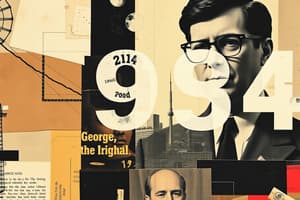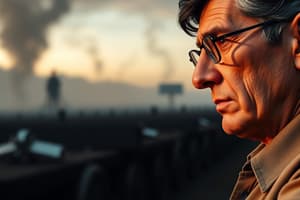Podcast
Questions and Answers
What happened on the sixth day of Hate Week?
What happened on the sixth day of Hate Week?
It was announced that Oceania was at war with Eastasia.
What is the explanation for the Eurasia signs when the real enemy becomes Eastasia?
What is the explanation for the Eurasia signs when the real enemy becomes Eastasia?
They get torn and ripped to shreds.
What happened for Winston during the disorder of tearing down posters?
What happened for Winston during the disorder of tearing down posters?
He got his briefcase with the book in it.
Why, at the end of the rally, did everyone from the Ministry of Truth have to go to work?
Why, at the end of the rally, did everyone from the Ministry of Truth have to go to work?
Through recorded time, what has there always been?
Through recorded time, what has there always been?
What are the three ways in which war is different than it was in the earlier decades of the twentieth century?
What are the three ways in which war is different than it was in the earlier decades of the twentieth century?
How much of Earth's population exist between nebulous frontiers of the super states?
How much of Earth's population exist between nebulous frontiers of the super states?
What is the primary aim of warfare since whatever resources are gained are used to support war?
What is the primary aim of warfare since whatever resources are gained are used to support war?
How was a hierarchical society possible?
How was a hierarchical society possible?
War not only destroys, but it has an added benefit. What is it?
War not only destroys, but it has an added benefit. What is it?
What word is missing in Newspeak?
What word is missing in Newspeak?
What are the two aims of the Party?
What are the two aims of the Party?
What are the two problems that make up the only subject matter of scientific thought?
What are the two problems that make up the only subject matter of scientific thought?
Why are citizens of Oceania forbidden to learn a foreign language or have contact with foreigners?
Why are citizens of Oceania forbidden to learn a foreign language or have contact with foreigners?
Oceania's philosophy is INGSOC. What are the other two superstates' philosophies?
Oceania's philosophy is INGSOC. What are the other two superstates' philosophies?
How would Winston define a good book?
How would Winston define a good book?
What was Julia's response when Winston told her that he received the book?
What was Julia's response when Winston told her that he received the book?
What are the different aims of the different types of people in the world?
What are the different aims of the different types of people in the world?
How has the Lows' position in life been softened?
How has the Lows' position in life been softened?
Machines made it possible that people no longer had to do what?
Machines made it possible that people no longer had to do what?
Who made up the new aristocracy?
Who made up the new aristocracy?
The difference between INGSOC and older forms of totalitarianism is that older societies didn't have the power to do what?
The difference between INGSOC and older forms of totalitarianism is that older societies didn't have the power to do what?
How did film and radio help the process of a totalitarian society?
How did film and radio help the process of a totalitarian society?
What are the four ways in which a ruling group can fall from power?
What are the four ways in which a ruling group can fall from power?
How can a government make sure that its people don't become aware that they are oppressed?
How can a government make sure that its people don't become aware that they are oppressed?
Flashcards are hidden until you start studying
Study Notes
Hate Week and Warfare
- On the sixth day of Hate Week, Oceania was declared to be at war with Eastasia.
- Signs indicating Eurasia were destroyed as the focus shifted to Eastasia as the enemy.
- The rally concluded with Ministry of Truth workers needing to rewrite history due to the war declaration that rendered previous information obsolete.
Societal Structure and Warfare
- Throughout recorded history, societies have been structured into three classes: the High, the Middle, and the Low.
- Modern warfare is characterized by limited aims, inability to destroy opponents, lack of material causes for conflict, and absence of genuine ideological differences.
- Approximately one-fifth of the earth's population exists in ambiguous territories between superstates.
- The primary objective of warfare is to maintain labor power, utilizing collected resources to support war efforts.
The Role of Poverty and Ignorance
- A hierarchical society thrives on poverty and ignorance among the populace.
- War serves as a method to expend labor without creating consumable goods, highlighting its dual destructive and economic purpose.
Language and Thought Control
- Newspeak omits the word "science," limiting intellectual capacity and inquiry.
- The Party seeks to dominate the earth and eliminate independent thought.
- Scientific thought is reduced to two subjects: understanding others' thoughts and mass elimination methods.
Isolation and Superstate Philosophies
- Citizens are prohibited from learning foreign languages or interacting with outsiders to prevent realization of common humanity and truths hidden from them.
- INGSOC governs Oceania; Eurasia follows Neo-Bolshevism, and Eastasia adheres to a philosophy of Death-Worship or Obliteration of the Self.
Perception of Literature and Social Dynamics
- A good book, in Winston's view, is one that aligns with what the reader already knows.
- Julia's casual acceptance of Winston's book symbolizes a shared understanding of rebellion.
- Different societal classes maintain distinct aims: the High seek to retain power, the Middle wish to ascend, and the Low aim for equality and abolishment of class distinctions.
Technological Influence and Ruling Class
- The plight of the Low class remains unchanged, enduring hardships without alleviation.
- Advancements in machinery have eroded traditional social and economic segregation.
- The new aristocracy primarily consists of bureaucrats, technicians, and various professionals, indicating a shift in elite composition.
Historical Control and Public Manipulation
- INGSOC distinguishes itself from previous totalitarian regimes by its capability to surveil citizens continuously.
- Film and radio facilitate propaganda, aiding in the manipulation of public sentiment.
- Four potential scenarios can lead to a ruling group’s decline: external conquests, inefficient governance, emergence of a discontented Middle, or loss of self-confidence in governance.
Maintaining Ignorance of Oppression
- Governments can prevent the awareness of oppression among their populace through strategic control and manipulation.
Studying That Suits You
Use AI to generate personalized quizzes and flashcards to suit your learning preferences.




